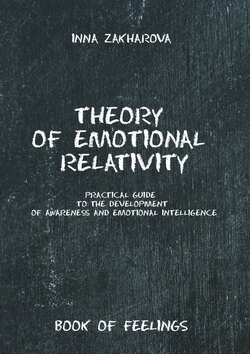Читать книгу Theory of emotional relativity. Practical guide to the development of awareness and emotional intelligence - Inna Zakharova - Страница 20
Fear
Fear. Processing
ОглавлениеFear has many names. This emotion has over 20 titles – a record among other emotions. This suggests that we very often face fear in everyday life.
It is believed that anxiety and fear are different emotions and conditions, that anxiety, unlike fear, does not imply real danger. We adhere to the opinion that anxiety and fear are not differentiated. If there is no danger in the real world, we imagine it very real within ourselves.
Doubt is fear of low intensity. When a person doubts, it means that he is in a certain state of anxiety, he looks for the right solution and is afraid to make a mistake. The more fears a person has, the more doubts he has. The doubting person does not always realize that he is now experiencing fear.
Low levels of fear: anxiety, worry. There are a lot of slangy and colloquial words for such states: (he bitches out, he pusses out, I get cold feet).
High levels of fear are horror, nightmare, panic, shock. Moreover, there is still a lot of movement in a panic, but in shock, we become paralyzed.
When moving over the scale of fear intensity, the range of movements varies from an excessive number of fussy movements to complete immobility.
Fear always signals us that our need for security is not satisfied. This need may not be satisfied right now, or we may be afraid that it will not be satisfied tomorrow, the day after tomorrow. Fear is strongly connected with our future.
When does fear appear?
When a person faces with an unknown situation, subconsciously, he calculates whether he has enough external and internal resources to cope with the current dangerous situation.
Fear appears when you understand
that you don’t have enough resources now
For example, if you meet a child in a dark alley who is trying to fight you, you won’t be afraid, it will be funny for you, you will take him by his little thin hands and lead him to his parents. Subconsciously, you have calculated the resources that you own and which are necessary in this situation. But if you have met a person who is three times taller than you and behaves aggressively, understanding on whose side the physical advantage, you will most likely regard the situation as extremely dangerous. However, if you have additional resources in the form of black belt in karate or bits in a backpack that you know how to use, the level of your fear decreases.
There are cases when you are not so knowledgeable that you cannot calculate whether you have enough resources to control the situation. Then it happens that a person feels confident and calm because of his ignorance and self-confidence. For example, a person is interviewed for a job that he has never done, he does not even know what he may not know, as a result of it he feels calm. In the same situation, a person, who does such work and knows what level of skill he needs in this area, will value his skills and knowledge more adequately and critically and, of course, worry more. The effect is “the more I know, the more I know how little I know.”
If you were invited to an interview to be headhunted to another organization, you will feel extremely confident because you have a job and a large number of resources: your immediate future is secure (you have something to eat, where to sleep, where to rest), and in this confident state you talk to people about whether they can increase your amount of resources and how many times. The level of fear will be minimal. But when you have no work, you are searching for it, there is much anxiety and fear, you are constantly estimating the amount of your resources (think about what you will eat tomorrow and the day after tomorrow, how the situation that you don’t work will affect your professional level).
Our physical condition is also a very important resource. When we didn’t get enough sleep, didn’t eat on time, our body feels bad – we have few resources. If you sleep badly, the next day you will be more anxious. If you had enough sleep you wouldn’t feel anxiety under the same conditions. We separate physiological needs from psychological ones, but when we talk about the need for security, it is important to understand that it is directly related to the amount of resources of the physical body.
After physical trainings, a person feels very calm, and if a person regularly goes in for sports, then his background condition is generally calmer, because the body is a very important resource. If you don’t eat on time, at the level of consciousness you understand well that you just don’t have time, you are busy with something. However, the subconscious mind will regard this situation differently: if you are hungry and do not eat, you have no food. And as a result, the level of anxiety increases. Due to prolonged dissatisfaction with physiological needs, you may notice that a person’s adequacy in behavior is lost. Typically, it happens to people with a leading need for security. People with other leading needs do not have such a strong connection of mood, diet and rest.
